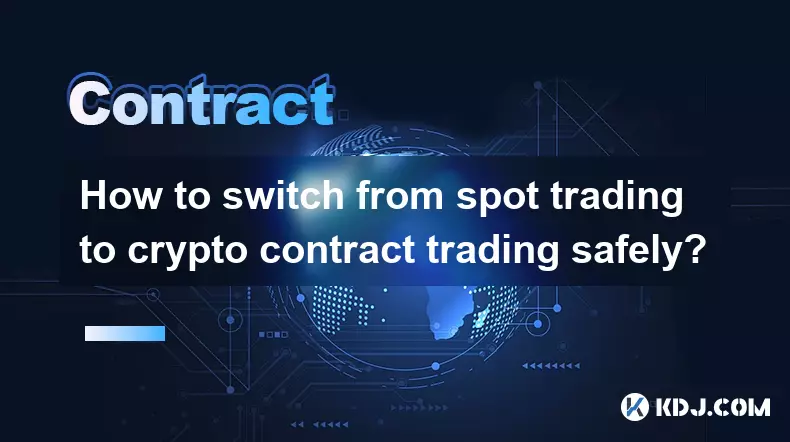-
 bitcoin
bitcoin $87959.907984 USD
1.34% -
 ethereum
ethereum $2920.497338 USD
3.04% -
 tether
tether $0.999775 USD
0.00% -
 xrp
xrp $2.237324 USD
8.12% -
 bnb
bnb $860.243768 USD
0.90% -
 solana
solana $138.089498 USD
5.43% -
 usd-coin
usd-coin $0.999807 USD
0.01% -
 tron
tron $0.272801 USD
-1.53% -
 dogecoin
dogecoin $0.150904 USD
2.96% -
 cardano
cardano $0.421635 USD
1.97% -
 hyperliquid
hyperliquid $32.152445 USD
2.23% -
 bitcoin-cash
bitcoin-cash $533.301069 USD
-1.94% -
 chainlink
chainlink $12.953417 USD
2.68% -
 unus-sed-leo
unus-sed-leo $9.535951 USD
0.73% -
 zcash
zcash $521.483386 USD
-2.87%
How to trade Bitget contract
Understanding Bitget contract trading involves grasping the concept of buying or selling cryptocurrencies at a predetermined price on a future date, unlocking the potential for speculating on future price movements and mitigating risk in volatile markets.
Nov 10, 2024 at 06:18 pm

Embarking on the world of cryptocurrency trading can be an intimidating endeavor, especially when navigating complex platforms like Bitget. However, with a structured approach, anyone can master the intricacies of Bitget contract trading and unlock its vast potential. This comprehensive guide will provide a step-by-step roadmap, answering pivotal questions and empowering you to trade Bitget contracts with confidence.
Step 1: Understanding Bitget Contract TradingBitget contract trading involves entering into agreements to buy or sell cryptocurrencies at a predetermined price, known as the strike price, on a specified future date. These contracts allow traders to speculate on future price movements and hedge their risk in volatile markets. Unlike spot trading, contract trading involves the use of leverage, which magnifies both potential profits and losses.
Step 2: Creating a Bitget Account and Funding itBefore you can start trading contracts on Bitget, you must create an account and fund it with supported cryptocurrencies. The registration process is straightforward and requires basic personal information. Once your account is verified, you can deposit funds using various methods, including bank transfer, credit/debit card, and cryptocurrency.
Step 3: Navigating the Bitget Contract PlatformBitget's user-friendly interface provides a comprehensive dashboard for managing your trading activities. The platform offers various order types, including limit orders, market orders, and stop-loss orders, allowing you to tailor your trading strategy to specific market conditions. Leverage options range from 1x to 100x, empowering traders with varying risk appetites.
Step 4: Understanding Contract SpecificationsEach contract type on Bitget has unique specifications, such as underlying asset, contract size, and expiration date. Thoroughly research and understand these terms before placing any trades. The platform offers perpetual contracts (USDT-Margined) with no fixed expiration and quarterly futures (COIN-Margined) expiring every three months.
Step 5: Placing Your First Contract TradeOnce you have identified the desired contract and determined your trading strategy, you can Place your order. Choose between a long (buy) or short (sell) position based on your market outlook. Specify the contract amount, leverage, and order type. Monitor the market closely and adjust your positions accordingly to manage risk and maximize returns.
Step 6: Managing Risk in Contract TradingLeverage, while amplifying potential profits, also magnifies losses. Effective risk management is crucial to preserve your capital. Use stop-loss orders to limit potential losses and monitor your trades regularly, adjusting your positions as market conditions evolve. Additionally, maintain a diversified portfolio to spread your risk across multiple assets.
Step 7: Monitoring and Closing Your TradesBitget provides real-time market data and charting tools to help you monitor the performance of your trades. Adjust your strategy if necessary, taking into account market fluctuations and news events. When ready, close your trades by executing an opposite order (selling if you bought or buying if you sold).
Step 8: Withdrawing Your ProfitsOnce you have successfully closed your trades, you can withdraw your profits from Bitget. Navigate to the withdrawal section of your account, select the desired cryptocurrency, and provide the withdrawal address. Your funds will be processed and transferred to your external wallet within a specified time frame.
Additional Considerations:- Customer Support: Bitget offers 24/7 customer support to assist you with any queries or troubleshooting.
- Trading Fees: Bitget charges competitive trading fees, which vary depending on the contract type and VIP level.
- Security: Bitget employs industry-leading security measures to safeguard user funds, including multi-factor authentication, cold storage, and anti-money laundering protocols.
- Education and Resources: Bitget provides educational materials, webinars, and market analysis to empower traders with the knowledge and skills to succeed.
Disclaimer:info@kdj.com
The information provided is not trading advice. kdj.com does not assume any responsibility for any investments made based on the information provided in this article. Cryptocurrencies are highly volatile and it is highly recommended that you invest with caution after thorough research!
If you believe that the content used on this website infringes your copyright, please contact us immediately (info@kdj.com) and we will delete it promptly.
- Crypto Crossroads: Bitcoin Price Reacts to Fed Jitters Amidst Shifting Sands
- 2026-02-02 05:05:02
- Justin Sun, Tron, Manipulation Allegations: New Bitcoin Strategy Meets Lingering Controversy
- 2026-02-02 05:05:02
- Bitcoin Eyes $77K as Michael Saylor Reaffirms Unwavering Conviction Amidst Market Swings
- 2026-02-02 05:00:02
- Altcoin Season on the Horizon? ETH, XRP, SOL, ADA Face Potential 184x Gains Amidst Shifting Crypto Landscape
- 2026-02-02 05:00:02
- Bitcoin ETF News: Latest Updates Drive Investment and Market Dynamics
- 2026-02-02 04:50:02
- Rare Royal Mint Coin Error Fetches Over £100: The 'Fried Egg' £1 Coin Phenomenon
- 2026-02-02 04:45:01
Related knowledge

How to close a crypto contract position manually or automatically?
Feb 01,2026 at 11:19pm
Manual Position Closure Process1. Log into the trading platform where the contract is active and navigate to the 'Positions' or 'Open Orders' tab. 2. ...

How to understand the impact of Bitcoin ETFs on crypto contracts?
Feb 01,2026 at 04:19pm
Bitcoin ETFs and Market Liquidity1. Bitcoin ETFs introduce institutional capital directly into the spot market, increasing order book depth and reduci...

How to trade DeFi contracts during the current liquidity surge?
Feb 01,2026 at 07:00am
Understanding Liquidity Dynamics in DeFi Protocols1. Liquidity surges in DeFi are often triggered by coordinated capital inflows from yield farming in...

How to trade micro-cap crypto contracts with high growth potential?
Feb 01,2026 at 02:20pm
Understanding Micro-Cap Crypto Contracts1. Micro-cap crypto contracts refer to derivative instruments tied to tokens with market capitalizations under...

How to optimize your workspace for professional crypto contract trading?
Feb 01,2026 at 08:20pm
Hardware Infrastructure Requirements1. High-frequency crypto contract trading demands ultra-low latency execution. A dedicated workstation with a mini...

How to switch from spot trading to crypto contract trading safely?
Feb 01,2026 at 03:59pm
Understanding the Core Differences Between Spot and Contract Trading1. Spot trading involves the immediate exchange of cryptocurrencies for fiat or ot...

How to close a crypto contract position manually or automatically?
Feb 01,2026 at 11:19pm
Manual Position Closure Process1. Log into the trading platform where the contract is active and navigate to the 'Positions' or 'Open Orders' tab. 2. ...

How to understand the impact of Bitcoin ETFs on crypto contracts?
Feb 01,2026 at 04:19pm
Bitcoin ETFs and Market Liquidity1. Bitcoin ETFs introduce institutional capital directly into the spot market, increasing order book depth and reduci...

How to trade DeFi contracts during the current liquidity surge?
Feb 01,2026 at 07:00am
Understanding Liquidity Dynamics in DeFi Protocols1. Liquidity surges in DeFi are often triggered by coordinated capital inflows from yield farming in...

How to trade micro-cap crypto contracts with high growth potential?
Feb 01,2026 at 02:20pm
Understanding Micro-Cap Crypto Contracts1. Micro-cap crypto contracts refer to derivative instruments tied to tokens with market capitalizations under...

How to optimize your workspace for professional crypto contract trading?
Feb 01,2026 at 08:20pm
Hardware Infrastructure Requirements1. High-frequency crypto contract trading demands ultra-low latency execution. A dedicated workstation with a mini...

How to switch from spot trading to crypto contract trading safely?
Feb 01,2026 at 03:59pm
Understanding the Core Differences Between Spot and Contract Trading1. Spot trading involves the immediate exchange of cryptocurrencies for fiat or ot...
See all articles










































































